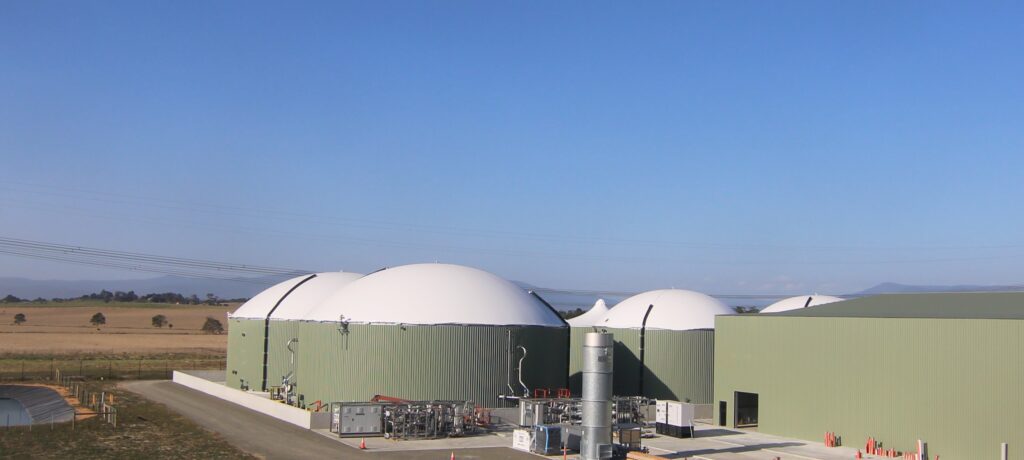Commercial & Industrial Bioenergy now in Australia
Delorean’s Engineering Division is Australia’s leading bioenergy infrastructure construction company for third parties.
Delorean’s Engineering Division (formerly Biogass Renewables) is Australia’s leading bioenergy infrastructure construction company for third parties. Business activities include Engineering, Procurement and Construction (EPC), and Operation and Management (O&M) of anaerobic digestion bioenergy plants.
Delorean Corporation also has extensive experience in tank manufacture, pipework and structural steel fabrication and we commercially engineer solutions for our projects, ranging from stainless steel lined tanks to custom-made structural steel and heat exchanger infrastructure.

Bioenergy infrastructure, built for impact.

Jandakot Bioenergy Plant

Blue Lake Milling Bioenergy Plant

Ecogas Bioenergy Plant

Yarra Valley Water Bioenergy Plant

Reduced Costs, Major New Reveneues.
We’re about pragmatic, feet-on-the-ground, commercially viable plants with investment returns that stack up.
Utilize organic waste for business.
Avoid transport costs and gate fees for waste disposal
Avoid electricity costs (peak and off-peak)
Avoid heating and gas costs
Power vehicles and equipment with upgraded biogas
Monetise valuable carbon credits under the Australian Government’s Clean Energy Futures Scheme.
Monetise surplus electricity and gas fed into the grid
Generate biofertiliser for use onsite or for sale
Rolling out Bioenergy for Australia’s Food, Resources and waste industry.
Delorean Corporation’s Engineering Division leads in delivering commercially viable anaerobic digestion plants to Australia and New Zealand’s industries. We focus on proven, mature technology widely used in the Northern Hemisphere. Our 2-megawatt bioenergy plant at Richgro Garden Products, operating for over 5 years, powers its composting and manufacturing operations in Perth, WA.


Reduce your Capex and Fastrack your return
Our engineering division qualifies for various state and federal grants, including CEFC renewable energy finance. With a proven track record in securing funding, we can develop and finance projects through Delorean Corporation or a joint model. We’ll guide your application for bioenergy plants that reduce energy costs and create new income. Contact us for more details.
Frequently Asked Questions
Most organic waste from commercial food, agricultural or manufacturing operations can be used to generate energy. This includes supermarket, kitchen, dairy, vegetable, abattoir and fishery waste, to grain and legume surplus, to ordinary garden waste. Biogas yields are dependant on the type of feedstock available and the mix of feedstocks used in the fermenter.
No. Anaerobic digestion has been around for years but in the last 20 years the efficiency of the technology has been improved through adoption by Northern Hemisphere manufacturing and agricultural industries. More than fifty new plants are built in Germany every month. Its use is new to Australian industry, outside of some existing public sector municipal waste and wastewater treatment plants.
The main benefits are avoided business operation costs, and generation new income streams. These include:
- avoided transport costs and gate fees for waste disposal
- avoided electricity costs (peak and off-peak)
- avoided heating costs
- powering vehicles and equipment with upgraded biogas
- monetising valuable carbon credits under the Australian Government’s Clean Energy Futures Scheme.
- monetising surplus electricity fed into the grid.
This depends on how much organic waste you have available and what your energy requirements or other business objectives are. Plant size can scale from a micro plant servicing 1000 tonnes of waste per annum, to 125,000 tonnes plus per annum. Our experience is that plants become economic above 10,000 tonnes per annum of waste.
It can be. Through our associated development company, Delorean Energy (deloreanenergy.com.au), we can potentially aggregate and supply the waste stream to support your plant, and we can take away the digestate by-product for recycled into usable products. Your business is free to use the energy from the plant and claim carbon credits if appropriate.
Contact us to discuss. We are pleased to explain the various options available to you.

Have a question?
Feel free to ask any questions, we’re here to help!

